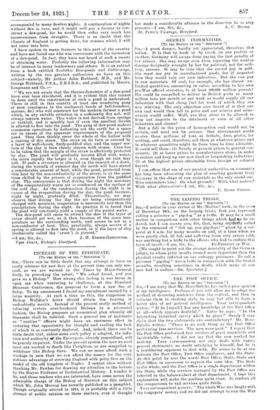GERMAN INDEMNITIES.
[To THE EDITOR or THE " SPECTATOR."] SIR,—A great danger, hardly yet appreciated, threatens this nation. It is that by hook or by creek, on one pretext. or another, Germany will escape from paying the just penalty of her crimes. She may escape even from repairing the wanton damage designedly wrought by her for political, not for mili- tary, reasons. It may be true that she cannot pay in gold. She must not pay in manufactured goods, for if imported here they would ruin our own industries. But she can pay in raw materials. Of coal, for example, she has almost un- limited quantities, amounting in value, according to her own pre-War official statistics, to at least 200,000 million pounds! She could be compelled to deliver in British ports as many million tons per month or per week as would supply all our industries with that cheap fuel for want of which they are now starving. The only objection ever heard of is that our own coal would th'en fall in price and our miners and mine- owners would suffer. Well, are they alone to be allowed to keep out imports to the detriment or ruin of all other industries and classes?
But a fall in the price of home-gotten coal would not lie certain, and need not be serious. Our Government would receive those millions of tons as tribute, free, gratis, for nothing, and could, therefore, sell them at whatever prices and in whatever quantities might be from time to time advisable. It could sell them—(1) Nearly at present prices to general con- sumers; (2) at lower prices to manufacturers alone, in order to restart and keep up our now dead or languishing industries; (3) at the highest pi-ices obtainable from foreign or colonial buyers.
I can affirm that one of our greatest authorities on economies has long been advocating the plan of exacting payment from Germany in the shape of raw materials as the only sound one. Who contradicts him? On what grounds? With what motive? With what alternative?—I am, Sir, (tc.,
Ii. SOMES SAXTON.


































 Previous page
Previous page